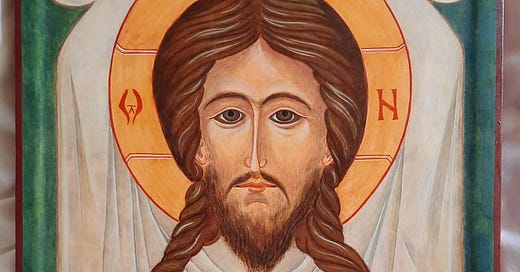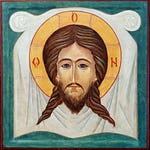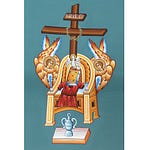[Note: the audio recording above will vary in places from the prepared text below.]
I want to reflect today on the first verse from Saint Paul’s Epistle to the Church in Philippi. He writes, “I press on toward the goal for the prize of the upward call of God in Christ Jesus.” What Paul is talking about is his own devotion to Christ. His devotion to Christ has an intentionality to it—his choosing to “press on”—that is, with effort, a choice to work in the vineyard to harvest fruit, so as to cooperate with the grace given him by the Holy Spirit.
Yet we must remember that in reading Paul’s epistles, we are reading his teaching, meant to teach the Church in Philipp, and to teach us: so that others are inspired by him and that they imitate him. By giving examples from his own devotion, he is showing disciples how to follow Our Lord’s commandment to deny oneself, take up one’s cross, and follow Jesus. Paul’s epistles are often him sharing his own technique as to how to follow Jesus, Who is the Way, the Truth, and the Life. Paul, like all the Saints, is to be both admired and, when possible, imitated.
So what is it that Paul is sharing that we can imitate? His own devotion, by his words, is marked by the characteristic of pressing on toward the goal for the prize of the upward call of God in Christ Jesus. But specifically, what is Paul describing? He is describing what the Holy Tradition of the Church has often called “Personal Devotion.” Paul’s guidance is to seek a robust Personal Devotion which is our life in the Holy Spirit, day to day. We are called as Paul was called: according to our unique personal characteristics, temperament, life situation, background, and gifts; the Holy Spirit calls us according to our whole personality. We are all members of Christ’s Body, members one of another in Him, but yet united as we are in Christ, we never lose our personality, our uniqueness, our story—we do not lose our identity, but what is transformed is not our identity as much as the horizon of our identity. In our baptism, our commonwealth, our citizenship, is stretched to heaven. This is what Paul is describing when he says “the upward call of God in Christ Jesus.” He is describing our heavenly citizenship, how he is living into his new horizons as a baptized Christian, and the work it takes to claim for ourselves the gift given to us in Baptism, the work it takes to cooperate with grace.
Week by week, we come to the Holy Altar, the summit of our Christian experience. We are fed, we are restored, and most of all, we are loved. And in being dismissed at the end of Mass, we are sent out into the world to continue our service to God in the world. In other words, flowing out of our liturgical experience is our Personal Devotion: our loving of God and neighbor in our day to day, seeking and serving Him in all people and doing so according to the Crucified and Risen Christ revealed in Scripture. Personal Devotion is anything we do that is done for the greater glory of God, and for greater intimacy with Him. Studying Scripture, studying the Saints, and giving to the poor are the classic expressions of personal devotion, but it also includes an innumerable spectrum of activities that bring beauty and goodness into the world: a spectrum ranging from tending a garden to being a responsible citizen; Personal Devotion includes all the ways we donate time, talent and treasure to God, through a charitable cause, through serving the lonely, to being a good listener, a good husband, a good wife, a good parent, a good grandparent, a good teacher, a good person when that adjective “good” always means “loves God” before it means anything else.
“Personal devotion” is described in the New Testament, in the second chapter of the Acts of the Apostles, as “continuing in the apostles’ teaching and fellowship.” That is Personal Devotion: the ways each of us lead our lives according to the proclamation of the Apostles and according to the Holy Spirit amid our fellowship in our parish. It is anything we do as we walk in God’s ways: as our life is led by God. Personal Devotion, our pressing on toward the upward call of God in Christ Jesus, means such good works as God has prepared for us to walk in.
True Christian spirituality, true Christian devotion, is based on our heavenly citizenship through Baptism. And in our Personal Devotion based on being baptized, we fulfill another of Paul’s teachings: we become stewards of the mysteries of Christ. By our Personal Devotion, we live in the vineyard of God prepared for us. When our devotion to God flows forth from liturgical prayer, we are living by the Holy Spirit in the Kingdom of God given to us—given to us to be stewards of Christ’s mysteries, stewards of Christ’s sacrificial gift, stewards in the vineyard that bears the fruit of eternal and everlasting life; fruit that comes of our works, fruit that comes of our hands, God ever working through our works, and through our hands, through our words, through our deeds—fruit of beauty and goodness, that others may taste and see the goodness of the Lord, and through us, know God is present. Amen.











Share this post